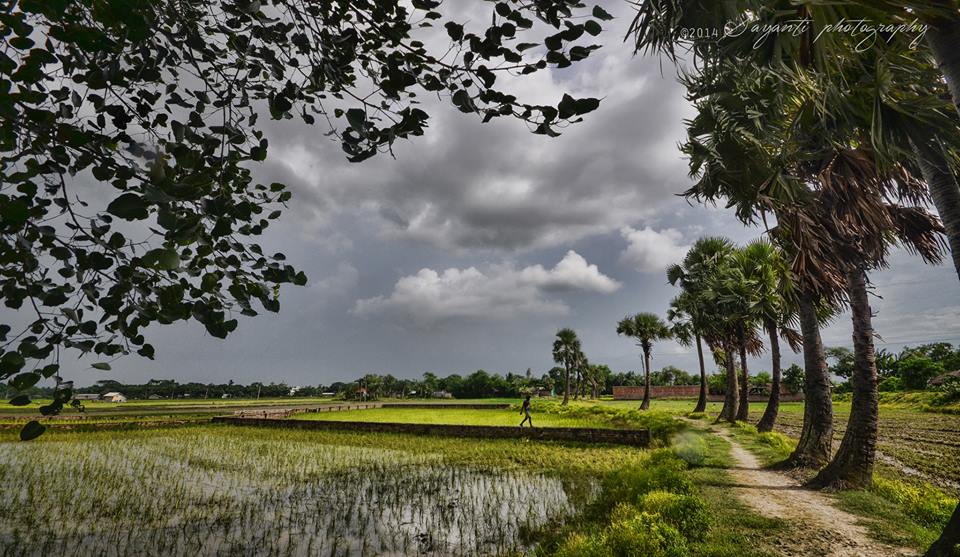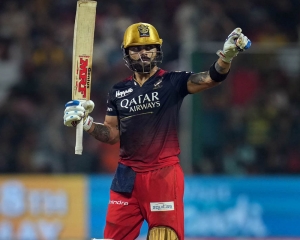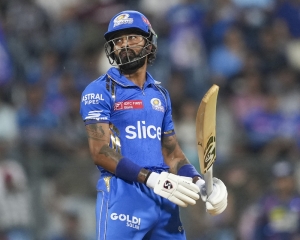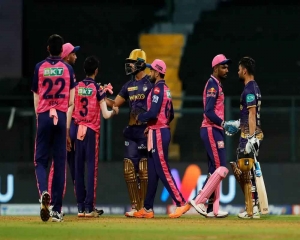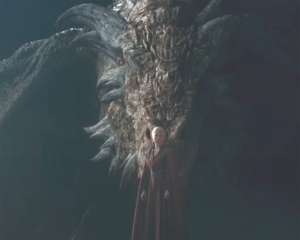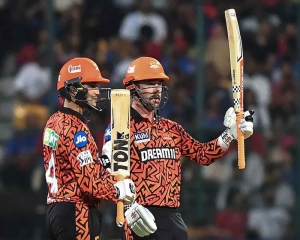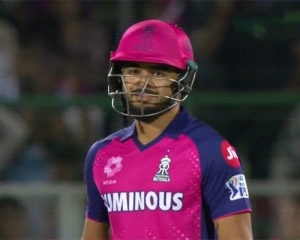Every time it rains in the hinterland of western Uttar Pradesh, where I now live, virtually on the edge of urban civilisation, I am reminded of the monsoon in Santiniketan. Memories come flooding in
My grandfather, the grandson of Babu Durga Prasad Gupta, Dewan of Tripura State, died at a young age. He was an investor of sorts and by all accounts an amiable man with no vices. The only occasion he made a fuss, according to family lore recounted by my grandmother’s elder sister, was when he was served tea in a chipped cup at a relative’s house.
Apparently, he was fond of the fine things in life, including fine China, something that was rarely heard of, and less seen, in Mymensingh households in what was then referred to as ‘East Bengal’. He died, possibly of heart ailment, even before he entered his forties, leaving behind a widow and five children of whom my father, barely into his teens, was the eldest.
Decades later, all that remained of my grandfather was a framed, faded sepia photograph on a wall in my grandmother’s room. Twice a year, on his birth and death anniversaries, the glass would be wiped clean, the frame dusted. A tuberose garland would adorn the photograph which would have made an excellent visual for the cover of Rabindranath Tagore’s celebrated novel, Gora.
An extended family ensured my grandmother and her children lived in comfort. If they grieved, it was for a man who had left far too soon than he should have. My grandmother’s father, Shirish Kabiraj, still fondly remembered by the thinning generation of Bengalis born in the 1930s and 1940s who grew up in Dhaka, was a wealthy practitioner of Ayurvedic medicine who lavished both money and affection on his children.
Before long, another event was to turn their lives upside down and leave them at the not-so-tender mercies of fate. Mohammed Ali Jinnah kept his word and extracted a terrible price for the follies of the Congress leadership. India’s independence and the creation of Pakistan fetched neither joy nor hope for Bengali Hindus on the other side of Padma.
Overnight they became strangers in their own land, unwanted and undesired by both Bengali Muslims and the Bihari Muslims who came pouring in to populate the eastern part of Jinnah’s moth-eaten Pakistan. Fleeing murderous hordes screaming Allah-o-Akbar was no doubt a memorable but an extremely frightening experience.
My grandmother sought and found shelter in a ramshackle family house near Kolkata; the protective umbrella of her large extended family was gone, swept away by the hurricane of partition.
Circumstances forced the kind-hearted to look away — nobody had enough for themselves, leave alone to share with others. The refugee was an object of pity at best and ridicule at worst.
Those who came in from the west were fortunate — they received large doses of resettlement assistance. Proximity with Delhi helped. But those who came in from the east were left to fester in refugee camps that later became refugee colonies and are now known as Kolkata’s southern suburbs.
A cousin of my grandfather, employed with what was then a British-owned boxwallah firm in Kolkata, stepped forward to stand by my grandmother and her children. He helped her deal with financial issues, oversaw the education — such as it was for refugees barely able to keep body and soul together — of my father and his siblings.
later, he found them, and the man their sister was to marry, appropriate jobs in the firm where he worked. And so it was that three brothers and their brother-in-law found themselves working in the same company. For my father and his brothers and sister, he was “Khoka Kaku”; for us, the children of the family, he was simply “Dadu”, the grandfather we never had. He was loved and revered by all.
A staunch Brahmo Samaji, he retired to Santiniketan where he built a house that was christened ‘Krishnakali’ after Tagore’s eponymous composition — “In the village they call her the dark girl / but to me she is the flower Krishnakali / On a cloudy day in a field / I saw the dark girl’s dark gazelle-eyes...”
Krishnakali is also the other name of Sandhya Malati, the many-hued brightly coloured four-o-clock flower that, along with Chukor or Roselle, whose sour fleshy scarlet petals were used for making a rustic chutney, virtually grew wild in Santiniketan. In those days, that was enough for an address. If you wrote a letter, you had to simply write ‘Krishnakali, Purva Palli, Santiniketan, Bolpur, West Bengal’ on the envelope.
His sister, Nilima Sen, the accomplished Rabindra Sangeet singer, lived in a house called ‘Sonajhuri’, named after a flower that grows abundantly in Bolpur. A Sonajhuri creeper draped the entrance; when in full bloom it was an amazing sight. The other thing I remember of that shaded house was the small lotus pond where hundreds of butterflies and dragonflies would hover over the mauve flowers of the Bengal water lilly, shanpla, during the monsoon and autumn months.
‘Krishnakali’ had a sprawling garden with scores of mango, guava and jackfruit trees. Across the road lay paddy fields beyond which ran metre-gauge railway tracks. Every few hours a train would chug by, its steam engine belching smoke. Watching Satyajit Ray’s Pather Panchali while in high school I was reminded of those trains framed by lush green paddy.
Amartya Sen, who, I am told, is related to the Gupta clan in some manner (all Badyis are, my editor at The Statesman, Sunanda K Datta-Ray, would say half-jokingly) would occasionally drop in for tea, invariably served on the red cement floored verandah, and regale us with stories.
The famous (those who faced his wrath would disagree) DM Sen was a frequent visitor. Unsmilingly stern with elders, he was rather nice with us children. His wife, my father’s prim and proper aunt in starched handloom cotton saree, wore socks with slippers in summer. In Jamshedpur, where the blue collared working class thought dimly of the white collared, there would have been hoots of laughter.
Everybody was extremely polite, spoke softly in chaste Bangla or BBC- accented English, smiled at each other. Nobody (except Dadu) ever laughed, no jokes were cracked, frivolities were abhorred. The wondrous curing powers of homoeopathy were discussed, as were the many interpretations of the Upanishads, after exchanging the latest news about offspring studying or teaching in foreign universities.
Snobbery, often inverted, came effortlessly to them. It was all very Tagorean. Very Brahmo. Very exclusive in a certain way.
Many years later I discovered that some of my relatives had written wills endowing handsome amounts of money for those of my generation who would pursue a career in academics, remain a true Brahmo, and not marry outside the faith. I think every potential beneficiary found himself or herself disqualified. Quite a bit of money lies forgotten somewhere, as do houses that have been long abandoned.
Sitting in a cane chair on the verandah of ‘Krishnakali’, you could see the monsoon clouds gathering in the late afternoon sky. First they would lazily roll in, turning the pale blue sky grey. Then they would suddenly begin to rush in; large inky blue-black clouds would darken the sky within minutes.
At that magical moment between the gathering of the clouds and their bursting into rain the egrets in the paddy fields would take flight, presenting a fascinating study of whitebirds against a black backdrop, captured in many Bengal water colours. Soon it would begin to rain, first large drops then a fine, sharp, seemingly incessant downpour. The red earth of Birbhum would turn into a rust-coloured mush.
Dragonflies would take cover beneath shimmering leaves and drenched birds would shuffle on the branches of the trees, looking miserably pitiful. From somewhere would waft in the lines of Tagore’s song, “Bahu juger opar hotey Ashaadh elo…” The gathering gloom of a wet evening, the moist air laden with the smell of rajanigandha, firangipani, hasnuhana and kadam blossoms, would fetch with itself a strange, haunting melancholy.
Every time it rains in the hinterland of western Uttar Pradesh, where I now live, virtually on the edge of urban civilisation, I am reminded of the monsoon in Santiniketan. Memories come flooding in, along with the melancholy.
(The writer is Commissoning Editor & commentator at ABP News)













